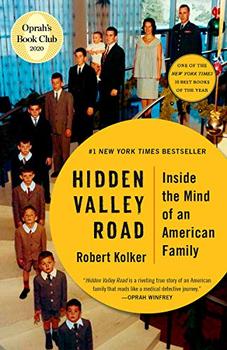Summary | Excerpt | Reading Guide | Reviews | Beyond the Book | Readalikes | Genres & Themes | Author Bio

Inside the Mind of an American Family
by Robert Kolker
But most of the time, Donald is consumed by religious matters. Explaining that Saint Ignatius conferred upon him a degree in "spiritual exercise and theology," he spends much of every day and many nights reciting in full voice the Apostles' Creed and the Lord's Prayer and a list of his own devising that he calls Holy Order of Priests, the logic of which is known only to him. D.O.M., Benedictine, Jesuit, Order of the Sacred Heart, Immaculate Conception, Mary, Immaculate Mary, Oblate Order of Priests, May Family, Black Friar, The Holy Ghost, Franciscan at the Convent, One Holy Universal, Apostolic, Trappist ...
For Mary, the prayers are like a faucet that won't stop dripping. "Stop it!" she shrieks, and yet Donald never does, pausing barely long enough to breathe. She sees what he's doing as a rebuke of her entire family, but mostly of their father, a faithful Catholic. Mary idolizes her father. So does every other Galvin child—even Donald did, before he got sick. When Mary sees her father coming and going from the house whenever he likes, she is envious. She thinks about the sense of control that her father must enjoy by working so hard all the time. Hard enough to get out.
It is the way her brother singles Mary out that she finds most unbearable—not because he is cruel but because he is kind, even tender. Her full name is Mary Christine, and so Donald has decided that she is Mary, the sacred virgin and mother of Christ. "I am not!" Mary cries, again and again. She believes that she is being teased. It would not be the first time that one of her brothers has tried to make a fool of her. But Donald is so unmistakably serious—so fervent, so reverential—it only makes Mary angrier. He has made Mary the exalted object of his prayers—bringing her into his world, which is the last place that she would ever want to be. The idea that Mary comes up with, the solution to the problem of Donald, is a direct response to the rage she feels. Her inspiration comes from the sword- and- sandals epics that her mother sometimes watches on television.
The idea starts with her saying, "Let's go up to the hill." Donald consents; anything for the sacred virgin. It continues with Mary suggesting that they build a swing on a tree branch. "Let's bring a rope," she says. Donald does as she says. And it concludes at the top of the hill, where Mary selects a tree, one of many tall pines, and tells Donald that she'd like to tie him to it. Donald says yes. And hands her the rope.
Even if Mary were to reveal her plan to Donald—to burn him at the stake, like the heretics in the movies—it is doubtful that he would react. He is too busy praying. He stands tightly against the tree trunk, lost in his own stream of words as Mary walks around the tree with the rope, circling and pulling until she believes he cannot break free. Donald does not resist.
She tells herself that no one will miss him when he's gone—and that no one will ever suspect her. She goes searching for kindling and brings back armfuls of twigs and branches, dropping them at his bare feet.
Donald is ready. If Mary really is who he insists she is, he can hardly say no. He is calm, patient, kind.
He adores her.
But on this day, Mary is serious only to a point. She has no matches, no way to make a fire. More crucially, she is not like her brother. She is grounded, her mind rooted in the real world. If nothing else, Mary is determined to prove that, not just to her mother, but to herself.
So she abandons her plan. She strands Donald on the hill. He stays up there, surrounded by flies and pasqueflowers, standing in place and praying for a very long time. Long enough that Mary gets some time to herself, but not so long that he doesn't come back down again.
*
She manages a smile now when she thinks about it. "Margaret and I laugh," she says. "I'm not sure others would find it quite so funny."
Excerpted from Hidden Valley Road by Robert Kolker. Copyright © 2020 by Robert Kolker. All rights reserved. No part of this excerpt may be reproduced or reprinted without permission in writing from the publisher.
I have lost all sense of home, having moved about so much. It means to me now only that place where the books are ...
Click Here to find out who said this, as well as discovering other famous literary quotes!
Your guide toexceptional books
BookBrowse seeks out and recommends the best in contemporary fiction and nonfiction—books that not only engage and entertain but also deepen our understanding of ourselves and the world around us.